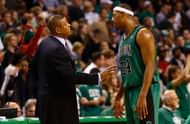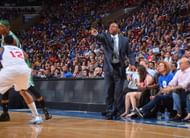The best coaches, in any sport, define themselves by a personality. The adjectives used to describe great NBA coaches are noticeably similar. The fact is, there’s one coaching narrative in the NBA which coaches, more often than not, merely fit into. The underpinnings of this personality – grit, defense, hard work, creative genius – are fairly common across the board. It’s why great coaches mentor more great coaches. It’s why great coaches adopt the systems pioneered by other great coaches. When you think Erik Spoelstra and Stan Van Gundy, you think defense-first, inside-outside basketball and for good reason. They come from Pat Riley stock, and Riley rode that system to greatness with the early 90s’ Knicks and late 90s- 2000s’ Heat. Basketball professor Kevin Pelton explains the “coaching tree” here. Good coaching, conventional basketball wisdom would hold, comes from learning in the right environments, with good mentors and implementing variations of tried-and-tested systems. Doc Rivers did not follow this career trajectory and that’s what makes his success so surprising.
Doc Rivers played basketball under great coaches, notably Riley and Gregg Popovich. His first head coaching gig with the Orlando Magic was offered to him while he was a coaching rookie, wet behind his ears, with no assistant coaching experience. While this is not unheard of in the NBA, it is fairly uncommon. So what does a coaching newbie like Rivers do with a Magic team a decade removed from its NBA inception and lacking its biggest star? What does he do with a team that called a 31-year old Darrell Armstrong – who never cracked double-digit scoring after the Rivers era – its leader and a bunch of marginal players half of whom would have struggled to crack rotations of playoff teams?
Easy. He turns it into a playoff team with a 41-41 record by sheer emotional leadership. In his first season, Rivers set the blueprint for his coaching legacy; the one thing that coaching systems cannot inherit, the one thing that greatness cannot pass on – how to build a team that is more than the sum of its parts. The genesis of Ubuntu happened with a mess of an Orlando team that, on paper, looked like a Who’s Who of future journeymen and washed up players in the NBA (Chucky Atkins, Pat Garrity, Michael Doleac). And that’s how he won the Coach of the Year award in his first season as a coach, of any sort. In the next two years as well, he led the Magic to first-round playoff appearances each year. But emotional leadership alone does not a great coach make.
Explore the NBA Draft 2024 with our free NBA Mock Draft Simulator & be the GM of your favorite NBA team.
In 2003, Tracy McGrady had just come off a career season where he led the league in scoring. A year away from free agency, the mandate was to get McGrady to commit long-term to Orlando. In 2003-04 Doc Rivers coached the Magic to a 1-10 record out of the gate. Head coaches in the NBA are ten rupees a dozen. Star players like McGrady were the gift of the Basketball Gods. The operational maxim for an NBA GM is always fire the Head Coach if anything goes awry with your season, and then reflect upon your mistakes. Doc Rivers, former COTY was fired. This was not a controversial firing a la Stan Van Gundy. This was more like Sam Mitchell from Toronto.
Second chances in the NBA don’t come easy.
Nobody believed, even as Rivers accepted a position with a Celtics team caught in a decade long losing funk. Nobody believed that Rivers had the personality, the coaching system, the know-how to win and win big in the NBA, and perhaps rightfully so. The Celtics missed the playoffs in year 2 and year 3 of the Rivers era, Paul Pierce was seriously contemplating a change of scenery from the near shambolic ruins (metaphorically speaking) of Boston’s TD Gardens and Celtics homer Bill Simmons was outspoken in his desire to see Rivers get the axe. Doc made a number of head-scratching plays throughout the 2006 season and displayed sheer tactical ignorance on more occasion than one. But then, here’s another thing you need to know about Doc Rivers: He has no quit in him. And he’s going to get better.
And he’s coming back for you. Doc is the NBA equivalent of Denzel Washington trapped in the physical frame of a Forest Whitaker. His egg-shaped, slightly chubby and drooping face can light up with fearsome intensity in seconds. By 2007, the Celtics had the tools for a championship team. The truth of the NBA is that championships are won with great players. But great players who do not play team-ball don’t win championships. And Doc Rivers doesn’t coach players – he coaches teams.
Putting together a Celtics team for the ages (with a starting five as good as any in the last decade), on a platform of defensive intensity and togetherness (Ubuntu). Kevin Garnett was the ultimate Doc Rivers player. Grit, emotional leadership, a never-back-down attitude and a will to win that simply obliterated everything in its path.
Over time, Doc has developed into a astute coach with several balls of magic hidden in the pockets of his suits. His out-of-bounds plays are the stuff of legend now. His screen action plays to open up shooters, misdirection plays and strong-side defense are part of the coaching manual. His resurrection of the Celtics gave us the stuff-of-dreams Celtics-Lakers Finals matchup twice last decade. He is now a great coach by every barometer of coaching genius and success. But it wasn’t always that way.
In 2006-07, Sam Mitchell, Head Coach of the Toronto Raptors, coached his Chris Bosh-led team to a 47-35 record on the heels of a 27 win season the year before – a full 30 game swing. He won Coach of the Year, just like Doc back in 2000. In 2008, after starting the season 8-9, Mitchell was fired, just like Doc once was.
Second chances don’t come easy in the NBA. Unless you have no quit in you. Unless you come back better.
Read more on the Top 5 Coaches in NBA here.
Orlando Magic Nation! You can check out the latest Orlando Magic Schedule and dive into the Magic Depth Chart for NBA Season 2024-25.


